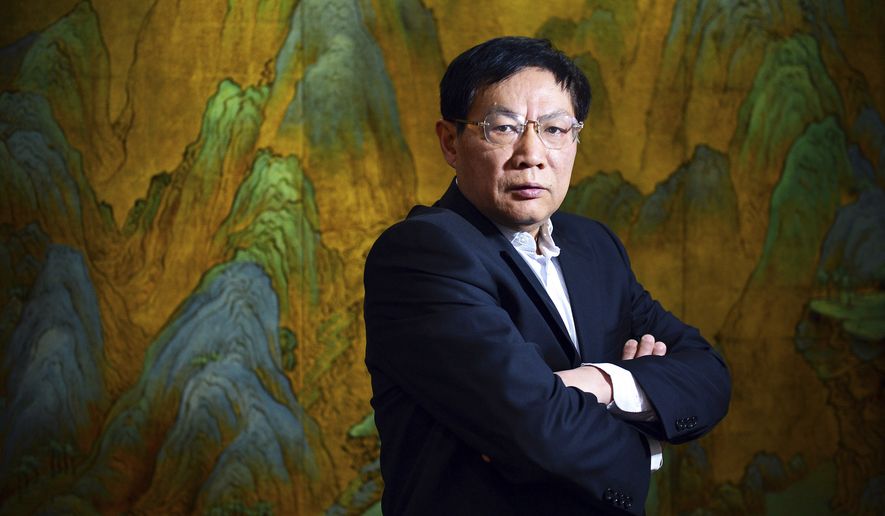The investigation of a prominent Chinese Communist Party critic of President Xi Jinping is the latest sign of growing opposition to his rule in the aftermath of the deadly coronavirus pandemic.
Authorities announced in a brief statement this week that Ren Zhiqiang, a property tycoon who is close to Vice President Wang Qishan, is under investigation for unspecified “serious violations of law and discipline.”
Until this year, Mr. Ren, a party member and “princeling,” as the offspring of the communist elite are called, was a rare public critic of Mr. Xi, one who has since 2016 avoided imprisonment or worse. Analysts attributed his survival to support for his views among some senior party leaders.
In February, however, Mr. Ren apparently sealed his fate by writing a letter harshly critical of Mr. Xi’s handling of the coronavirus outbreak, part of a widespread albeit quiet condemnation of the president’s response.
Health researchers say China covered up early indications of the disease, silenced doctors who tried to warn the public and allowed millions of people in Wuhan, the center of the outbreak, to leave the city for the Lunar New Year, thus spreading the disease. Mr. Ren’s Feb. 18 letter said the crisis validated his 2016 charges that the lack of an independent press had given the government unchecked power.
“When there is no media to represent the people and report the real situation, we are only left with people losing their lives from the virus, and the collective harm from the seriously ill political system as the result,” Mr. Ren wrote, comparing Mr. Xi’s rule to the personality cult of Mao Zedong and ridiculing his Feb. 3 speech to party leaders on the crisis.
“Standing there was not some emperor showing us his ’new clothes,’ but a clown with no clothes on who was still determined to play emperor,” the letter read in part.
Mr. Ren disappeared from public view March 12 and has not surfaced since. The charge of violating the law indicates he will face some type of trial in the future.
Analysts say Mr. Ren speaks for Xi opponents in the Chinese Communist Party. Wu Guoguang, a former Chinese official, said the circulation of Mr. Ren’s letter indicates “the rise of discontent among CCP elites against Xi.”
“The variety of crises the Xi regime has experienced — and, actually created — especially the Wuhan-originated global pandemic, has helped to mobilize internal resistance to Xi to a new extent Xi has never seen since coming to power,” said Mr. Wu, now a political science professor at University of Victoria, in British Columbia, Canada.
Xi in control
For now, however, the leader seems in full control. The use of a letter written by a connected party member shows the weakness of those seeking to challenge Mr. Xi through institutional channels, Mr. Wu said.
The investigation revealed this week appears to be an effort by Mr. Xi to suppress any voices of discontent and to deter further criticism.
But Mr. Xi faces opposition from party elites who are seeking a return to the reforms of former leader Deng Xiaoping. Deng blocked radicals in the party after Mao’s death and put China on the path of economic reform while retaining the communist system.
Andrew Nathan, a China expert at Columbia University, said domestic opposition to Mr. Xi is present but there are no signs of high-level dissension against him.
“Lots of people at lower levels in the party are disgruntled, but as far as I can tell Xi has surrounded himself with loyalists at the higher levels,” he said.
Mr. Nathan compared the situation to the limited opposition to President Trump within the Republican Party: “Xi is delivering for the CCP like Trump is delivering for the Republicans.”
Mr. Xi has ruled since 2012 with an iron fist and used a nationwide anti-corruption campaign to crack down on perceived rivals. Hundreds of party officials, including several in the most senior ranks of the party and the People’s Liberation Army, were felled in the campaign that consolidated the president’s power.
Targets have included Zhou Yongkang, once a member of the Politburo Standing Committee; regional Communist Party Chief Bo Xilai; and two generals on the Central Military Commission, also headed by Mr. Xi.
The Commission for Discipline Inspection in Beijing, the party’s investigatory arm, said it was investigating Mr. Ren, a former senior executive of the state-controlled property developer Huayuan Real Estate Group with a huge social media following.
His 2016 social media post criticizing what he called the “complete split of two opposing camps” — the 1.4 billion people and the 87.8 million Party members — struck at a central tenet of the ruling party since taking power in 1949: that the people and party are one.
But after cyber authorities deleted his Weibo account, the official Beijing city Communist Party Propaganda Department website posted a statement that questioned whether senior party leaders were fostering Mr. Ren’s “anti-Party” critiques.
That was viewed a critique of Mr. Wang, at the time a Politburo Standing Committee member and now vice president. Mr. Wang is viewed a China’s financial czar who controls much of the vast Chinese economy but who has been marginalized in recent months by Mr. Xi.
Back in 2016, Mr. Wang’s discipline inspection commission issued a statement supporting Mr. Ren, pointedly noting that Mr. Xi himself once suggested that it was “better for a single man to challenge conventional wisdom by speaking out than for a thousand people to nod their heads in unquestioning agreement.”
• Bill Gertz can be reached at bgertz@washingtontimes.com.




Please read our comment policy before commenting.